| THE RUNNING MATE | |
| August 7,
2000 |
||
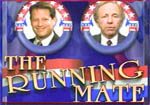
|
|
Connecticut Senator Joseph Lieberman will run for vice president on the Democratic ticket. After a background report, three colleagues discuss Lieberman's record and the effect of his candidacy on the presidential race.
|
|
GWEN IFILL: Now, we hear from people who have worked closely
with the Senator over the years. Al From is executive director of the
Democratic Leadership Council. Senator Lieberman has chaired the DLC
since 1995. And we're joined by retired Republican Senator Dan Coats
of Indiana; he served with Senator Lieberman on the Armed Services Committee.
We expect to be joined shortly by Sam Gejdenson, a Connecticut Democrat
who has served 10 terms in the House and obviously is a colleague of
Senator Lieberman's. AL FROM, Democratic Leadership Council: Well, I think it's a wonderful thing. I think it's a bold choice on the part of Vice President Gore. I think it's good for the country. I think it's good for the Democratic Party. And I think it's going to be terrific for the Gore-Lieberman ticket. |
|||||||||||||||||||
| Differences of opinion | ||||||||||||||||||||
|
GWEN IFILL: Dan Coats? FORMER SEN. DAN COATS: First of all, Joe Lieberman's a terrific GWEN IFILL: In your years with working with Senator Lieberman in the Senate, do you think these issues, conflicts as you describe them, would be a problem for the Gore-Lieberman ticket? FORMER SEN. DAN COATS: I think it's a problem for Al Gore in explaining why his vice presidential choice has chosen positions that are very close to what George Bush is espousing and yet Al Gore has attacked already on the stump. I'm not sure how they're going to handle that problem. AL FROM: Let me just say that there are two parts to the answer to Senator Coats' question. One, he's wrong on a lot of things. And second... GWEN IFILL: Senator Coats or Senator Lieberman? AL FROM: Senator Coats. On the fundamental issues, Senator Lieberman
and Vice President Gore are together. Secondly, one of the things that
shows is that the Vice President has the capacity and the GWEN IFILL: What about vouchers? AL FROM: Joe Lieberman has... GWEN IFILL: School vouchers. AL FROM: Joe Lieberman has supported experiments with school vouchers in the District of Columbia, but his fundamental position on education is the same as Al Gore's. It's to invest more and to demand more. GWEN IFILL: Isn't that entirely different, the vouchers issue, from where Al Gore stands? AL FROM: The Vice President opposes vouchers, and Lieberman...the Gore-Lieberman ticket will oppose vouchers. As I said, this is an indication, I think, of the Vice President's willingness to pick somebody who is an independent thinker, who will add to the ticket, but in the end, it's the Vice President's positions that will prevail. GWEN IFILL: Senator Coats, how independent a figure is he really? He supports abortion rights. He supports gun control. He's voted for tax increases. FORMER SEN. DAN COATS: Well, as I said, on the fundamental issues of
this campaign, Social Security, the privatization aspect of it, to allow
individuals to set up private savings accounts, that is a position that
Joe Lieberman and Governor Bush have taken. National defense, national
missile defense, there's a big difference between Joe |
 |
|||||||||||||||||||
| 'A true centrist' | ||||||||||||||||||||
|
GWEN IFILL: Congressman Sam Gejdenson joins us from New York. REP. SAM GEJDENSON: It's a great pick. I think it really distinguishes
the two campaigns. George W. Bush picked somebody Joe Lieberman is a true centrist; he's a consensus builder. He's somebody who really speaks to the difference between George W. Bush and Al Gore. Al Gore has demonstrated in his first act in his run for the presidency how broad his appeal will be and the confidence he has in his own positions by picking somebody -- the first Jewish candidate people talk about a lot. This is somebody who worked his way up from the bottom. His father ran a small store. He got to Yale on his own. He got great grades at Yale. He was head of the paper at Yale. This is somebody who graduated near the top of his class as a young man -- takes on the political establishment, ends up in the state Senate. GWEN IFILL: Congressman, let me try something on you. How will he be against Dick Cheney? Neither of these two vice presidential candidates are known as spark plugs. REP. SAM GEJDENSON: Let me tell you -- I think it's the one place the
press has underestimated Joe Lieberman. He's gotten a great reception
today, but people write him off as not an energetic debater. I think
he has a little different style than the old fiery orator, but he is
very GWEN IFILL: Al From, obviously Joe Lieberman is known best for the speech he gave on the Senate floor, putting great distance between himself and a lot of Democrats and the behavior of Bill Clinton during the impeachment saga. Do you think that he's nice, as Congressman Gejdenson has been saying? AL FROM: I think Joe Lieberman is a wonderful man, he's a man who lives his values. And what he did is he criticized President Clinton when President Clinton was wrong. But he also stood with President Clinton when the Republican Congress went overboard and tried to impeach him when they were wrong. So he is a man of independence and integrity. GWEN IFILL: Does it help the Democratic ticket to have someone who is part of it who criticized the President? AL FROM: He criticized the President when the President was wrong. And he has been a partner of the President in the incredible accomplishments of this administration. And, you know, I think it is very helpful to have somebody on the Democratic ticket who runs on the record of the Clinton-Gore administration because that is an incredible record. You know, if you listened to the Republicans in Philadelphia, you'd think this prosperity just sort of materialized out of thin air. But, don't forget, when we took office in 1992, unemployment was over 7 percent. Inflation was higher. Wages were and incomes were going down, poverty was going up, welfare was exploding. Crime was high. All those things were turned around with the Clinton-Gore policies.
AL FROM: What Joe Lieberman brings is somebody who brings the same centrist, new Democrat point of view that President Clinton and Vice President Gore have come -- and with Vice President Gore, will be able to lift those policies to a new level. |
 |
|||||||||||||||||||
| Focus on the presidency | ||||||||||||||||||||
|
GWEN IFILL: How about that, Senator Coats? We've heard a lot of talk in this discussion so far about how much Senator Lieberman was an atypical Democrat. Does that help the Democrats against the Republicans in this presidential time? FORMER SEN. DAN COATS: I don't think it allows Al Gore to escape his
ties with Clinton and the Clinton administration. I think in the end
this race will come down between Al Gore and George Bush. GWEN IFILL: Congressman, you mentioned a few moments ago about Joe Lieberman's religion. Do you think that will hurt or help or have no effect at all? REP. SAM GEJDENSON: I think what it shows really is something about Al Gore, that he had the courage to look at the man and not look at where he came from. And I really think that this decision by Al Gore is going to strengthen the ticket. I think one of the ways you know this was a great decision is when you listen to Republican pundits today, they're no longer talking about the role of the vice presidential candidate in the debate. They're now saying the vice presidential candidates don't matter. It's going to be the two candidates. I think Al Gore wins that debate with George W., But he also showed his strength today by picking Joe Lieberman, somebody who is thoughtful, courageous, hard working, and is a real plus to this ticket. He's somebody who has shown the character that most politicians want to talk about. He's lived that life, living his beliefs, fighting for the things he believes in and working within the system to make this a better country. It's a great choice. And we now have two people in the Democratic nominating process, the presidential candidate and vice presidential candidate, who know foreign policy, who know domestic policy, who understand defense policy. Mr. Bush had to pick Dick Cheney to give him support in the areas where people were worried about him in the areas of foreign policy and defense. Al Gore didn't need that. He went out and picked the best number two there was. And he didn't look at anything else. And that's a great statement about Al Gore and Joe Lieberman. GWEN IFILL: Sam Gejdenson, Al From, Dan Coats, thank you all very much. |
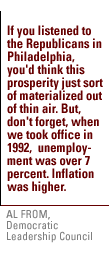 |
|||||||||||||||||||
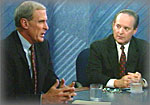 fellow,
and I'm a good friend. It's hard to say anything negative about him,
but I do think it raises the question about Al Gore, why he chose Joe
Lieberman, because their positions on some of the key issues in this
campaign, Social Security reform, education, national defense -- Joe
Lieberman's much closer to George Bush than he is to Al Gore and how
he's going to finesse that or answer that I'm not exactly sure. And
how Al Gore's going to explain that, whether it's another attempt to
reinvent Al Gore or another attempt to cover both sides of the issue,
I think is going to be a question, because there are very fundamental
issues where Al Gore has attacked Governor Bush for taking that position,
and yet it's exactly the same position or very close to what Joe Lieberman
has done and said on the Senate floor.
fellow,
and I'm a good friend. It's hard to say anything negative about him,
but I do think it raises the question about Al Gore, why he chose Joe
Lieberman, because their positions on some of the key issues in this
campaign, Social Security reform, education, national defense -- Joe
Lieberman's much closer to George Bush than he is to Al Gore and how
he's going to finesse that or answer that I'm not exactly sure. And
how Al Gore's going to explain that, whether it's another attempt to
reinvent Al Gore or another attempt to cover both sides of the issue,
I think is going to be a question, because there are very fundamental
issues where Al Gore has attacked Governor Bush for taking that position,
and yet it's exactly the same position or very close to what Joe Lieberman
has done and said on the Senate floor. 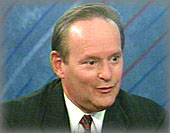 leadership
and the confidence to pick somebody who is known for his independence,
known for his integrity, who may in some instances have different opinions
than he does on the issues. But let's look at the big issues: On taxes,
on the federal budget, Joe Lieberman, like Vice President Gore, wants
the pay down the debt in 12 years. George Bush wants to have a big tax
cut. On Social Security, Joe Lieberman supports Al Gore's position of
Social Security plus. He believes that we ought to save the Social Security
system by paying down the debt, and then on top of that, have optional
private accounts that would be on top of Social Security. Not taking
the private accounts out of the payroll tax. So on that issue, Joe Lieberman
is with Al Gore.
leadership
and the confidence to pick somebody who is known for his independence,
known for his integrity, who may in some instances have different opinions
than he does on the issues. But let's look at the big issues: On taxes,
on the federal budget, Joe Lieberman, like Vice President Gore, wants
the pay down the debt in 12 years. George Bush wants to have a big tax
cut. On Social Security, Joe Lieberman supports Al Gore's position of
Social Security plus. He believes that we ought to save the Social Security
system by paying down the debt, and then on top of that, have optional
private accounts that would be on top of Social Security. Not taking
the private accounts out of the payroll tax. So on that issue, Joe Lieberman
is with Al Gore. 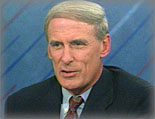 Lieberman's
positions -- I served with him on the Armed Services Committee -- and
Vice President Gore. Joe Lieberman is much more supportive of a national
missile defense. On education, one of the fundamental issues of this
particular campaign, Joe Lieberman was my Democrat cosponsor on the
entire voucher fight, trying to provide opportunities for people in
low-income neighborhoods, particularly minorities, to have an opportunity
to get out of a failing public school, using a scholarship to get to
a private school. We tried every which way possible to try to break
the monopoly of the education establishment. They were denied. Joe Lieberman
took very courageous and passionate, pleading stands with his colleagues
in an attempt to try to convince them that we ought to reach out to
these minorities. And yet, Al Gore was part of the Clinton-Gore effort
to stop us, and they did stop us.
Lieberman's
positions -- I served with him on the Armed Services Committee -- and
Vice President Gore. Joe Lieberman is much more supportive of a national
missile defense. On education, one of the fundamental issues of this
particular campaign, Joe Lieberman was my Democrat cosponsor on the
entire voucher fight, trying to provide opportunities for people in
low-income neighborhoods, particularly minorities, to have an opportunity
to get out of a failing public school, using a scholarship to get to
a private school. We tried every which way possible to try to break
the monopoly of the education establishment. They were denied. Joe Lieberman
took very courageous and passionate, pleading stands with his colleagues
in an attempt to try to convince them that we ought to reach out to
these minorities. And yet, Al Gore was part of the Clinton-Gore effort
to stop us, and they did stop us. 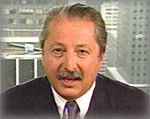 from
his father's presidency. It goes to the past. Al Gore looks to the future.
He picks Joe Lieberman, one of the brightest members of the United States
Congress. He's a very hard worker. He builds coalitions. And I think
the fact that there are some differences between Al Gore and Joe Lieberman
shows the strength of this presidential candidate. And remember, Joe
Lieberman is a centrist. Unlike Dick Cheney, who is a very nice man,
he's on the right wing even of the Republican Party, voting to not ban
plastic guns, voting not to ban armor-piercing bullets.
from
his father's presidency. It goes to the past. Al Gore looks to the future.
He picks Joe Lieberman, one of the brightest members of the United States
Congress. He's a very hard worker. He builds coalitions. And I think
the fact that there are some differences between Al Gore and Joe Lieberman
shows the strength of this presidential candidate. And remember, Joe
Lieberman is a centrist. Unlike Dick Cheney, who is a very nice man,
he's on the right wing even of the Republican Party, voting to not ban
plastic guns, voting not to ban armor-piercing bullets.  smart.
He's very sharp. And he has a niceness about him that's going to be
very successful in debates. Both Mr. Cheney and Mr. Lieberman, Senator
Lieberman, are very nice people. So that's going to work to both their
advantages, but I tell you, I wouldn't want to debate Joe Lieberman.
He may be more quiet than some, but he's a brilliant debater.
smart.
He's very sharp. And he has a niceness about him that's going to be
very successful in debates. Both Mr. Cheney and Mr. Lieberman, Senator
Lieberman, are very nice people. So that's going to work to both their
advantages, but I tell you, I wouldn't want to debate Joe Lieberman.
He may be more quiet than some, but he's a brilliant debater. 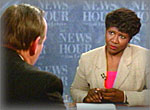 GWEN
IFILL: Let's just try to keep this conversation to talking about Mr.
Lieberman for now, because we can talk about the Clinton-Gore policies
all next week at the Democratic Convention.
GWEN
IFILL: Let's just try to keep this conversation to talking about Mr.
Lieberman for now, because we can talk about the Clinton-Gore policies
all next week at the Democratic Convention.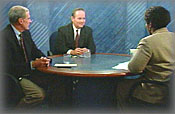 That's
what the public will focus on. We have two men that are well thought
of and highly respected in Dick Cheney and Joe Lieberman. They are complements
to both of their tickets. But I think the real focus will be on the
presidency. In the respect of the impeachment inquiry, I was presiding
in the chair when Joe Lieberman came to the floor, and he gave that
speech. He was the first Democrat to step forward, one of the only ones,
and he articulated with great feeling his loss of, I think, respect
for the President, his conduct, he called it deplorable. I think immoral
is the word he used -- lying under oath. He thought it had a very negative
effect on America's children and America's families. Juxtapose that
with Al Gore calling this the greatest President and saying he was proud
of this President at a time when Joe Lieberman was saying he was severely
disappointed in this President. I think those two images are going to
be difficult for Al Gore to explain.
That's
what the public will focus on. We have two men that are well thought
of and highly respected in Dick Cheney and Joe Lieberman. They are complements
to both of their tickets. But I think the real focus will be on the
presidency. In the respect of the impeachment inquiry, I was presiding
in the chair when Joe Lieberman came to the floor, and he gave that
speech. He was the first Democrat to step forward, one of the only ones,
and he articulated with great feeling his loss of, I think, respect
for the President, his conduct, he called it deplorable. I think immoral
is the word he used -- lying under oath. He thought it had a very negative
effect on America's children and America's families. Juxtapose that
with Al Gore calling this the greatest President and saying he was proud
of this President at a time when Joe Lieberman was saying he was severely
disappointed in this President. I think those two images are going to
be difficult for Al Gore to explain.